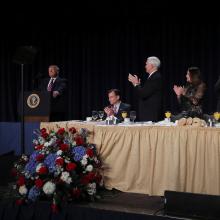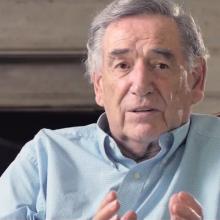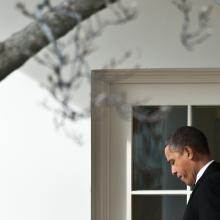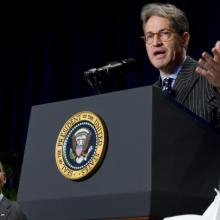national prayer breakfast
I did not attend the National Prayer Breakfast this morning, though I have done so in the past. The longtime Washington tradition brings together members of Congress from both political parties along with thousands of faith leaders, and every president since Dwight D. Eisenhower has attended. But this is not a time in our nation for habitual or vague prayers for an audience, given the moral and political crisis we now find ourselves in — or one that starts with the president of the United States holding up a newspaper headline saying “Acquitted,” and quickly invoking an impeachment process corrupted by partisan politics.
At Thursday's National Prayer Breakfast, President Donald Trump kicked off his remarks by pointing to the "terrible ordeal" of impeachment, apparently taking aim at Sen. Mitt Romney (R-Utah), who voted to convict the president on the charge of abuse of power a day earlier, and House Speaker Nancy Pelosi (D-Calif.), who said recently she prays for the president.
Political rhetoric linking the United States with a divine power emerged on a large scale with the outbreak of the Civil War in 1861. M.R. Watkinson, a Pennsylvania clergyman, encouraged the placement of “In God We Trust” on coins at the war’s outset in order to help the North’s cause. Such language, Watkinson wrote, would “place us openly under the divine protection.”
While avoiding the policy pronouncements that marked last year, Trump at this year’s breakfast spoke of a desire to “worship without fear” — a nod to religious freedom concerns often expressed by evangelical leaders.
“In a town where powerful people are constantly trying to increase their name recognition and their brand, Doug Coe was the opposite of that,” said Michael Cromartie, director of the Evangelicals in Civic Life program at Washington’s Ethics and Public Policy Center. “He was a man who liked to work behind the scenes, who did not call attention to himself, who was a sort of a pastor to people in power.”
The day before President Trump used his remarks at the National Prayer Breakfast to promise a repeal of the Johnson Amendment, a bill was introduced in Congress to effectively do that. It has not yet been scheduled for debate or a vote.
The Free Speech Fairness Act is being touted as a “fix” to the Johnson Amendment, a 1954 law that prohibits nonprofits from engaging in politics. But how much of a fix would the act be? Would it offer a First Amendment right of free speech to clergy — or trample the same First Amendment’s guarantee of a separation between church and state?
We sit here today, as the wealthy and the powerful. But let us not forget that those who follow Christ will more often find themselves not with comfortable majorities, but with miserable minorities. Today our prayers must begin with repentance. Individually, we must seek forgiveness for the exile of love from our hearts. And corporately as a people, we must turn in repentance from the sin that scarred our national soul.
President Donald Trump vowed to make good on a campaign promise to repeal the law that restricts political speech from the pulpit, speaking at his first National Prayer Breakfast as president.
“I will get rid of, totally destroy, the Johnson Amendment, and allow representatives of faith to speak freely and without fear,” he said on Feb. 2 to a gathering of 3,500 faith leaders, politicians, and other dignitaries from around the world, including King Abdullah of Jordan.
“This magnificent grace, this expansive grace, this ‘Amazing Grace’ calls me to reflect. And it calls me to pray. It calls me to ask God for forgiveness, for the times that I’ve not shown grace to others, those times that I’ve fallen short.”
Speaking slowly at times as he talked about how he is comforted by Scripture and the faith of others, Obama said he has lately focused on a Bible verse from 2 Timothy: “For God has not given us a spirit of fear, but of power and of love and of a sound mind.”
He said now is the best period to have that scriptural assurance.
“What better time in these changing and tumultuous times to have Jesus standing beside us, steadying our minds, cleansing our hearts, pointing us towards what matters,” he said.
Ben Carson, the retired neurosurgeon once best known for separating conjoined baby twins, is expected to announce May 4 that he will pursue a GOP candidacy for U.S. president. Carson is now known as a culture warrior whose criticisms of President Obama have made him a favorite of conservatives.
Here are five faith facts about him.
I’m very offended. Or so I’m told. As a believing Christian, I’m supposed to be deeply troubled by the remarks that President Barack Obama delivered at the recent National Prayer Breakfast here in Washington, DC. Former Virginia governor Jim Gilmore had this to say:
The president’s comments this morning at the prayer breakfast are the most offensive I’ve ever heard a president make in my lifetime. He has offended every believing Christian in the United States. This goes further to the point that Mr. Obama does not believe in America or the values we all share.
Strong words. But what were Obama’s terribly offensive remarks? Here’s what the president said:
And lest we get on our high horse and think [religious violence] is unique to some other place, remember that during the Crusades and the Inquisition, people committed terrible deeds in the name of Christ. In our home country, slavery and Jim Crow all too often was justified in the name of Christ.
Wait… what? Why should I be offended by that? That’s a fact. That’s our history. Every Christian should be aware of what we are capable of when we turn our eyes away from the self-sacrificing love of Jesus and instead turn Christianity into an ideology that justifies terror, brutality, oppression, and war.
It should be impossible to study Western history without getting some glimpse into the terrifying possibilities that any religious system — including Christian ones — hold out for those who seek to dominate others. We humans have a long track record of twisting our most precious faith into a weapon of violence and hatred. This shouldn’t be a controversial statement; it should be a matter of ongoing repentance and prayer for people of faith everywhere.
So I’m confused.
President Obama’s political opponents are outraged over his remarks at last week’s National Prayer Breakfast comparing Islamic violence to historic Christian violence. Jim Gilmore, former chairman of the Republican National Committee, called the remarks “the most offensive I’ve ever heard a president make in my lifetime.”
But anyone who is angry with Obama’s speech must also express the same wrath toward one of the greatest presidential speeches in American history, Abraham Lincoln’s Second Inaugural Address, delivered 150 years ago next month.
Obama used his annual remarks at the National Prayer breakfast to condemn radical Islam (though he didn’t use the term). In the process, he made some more general comments about how religion has been used — both today and in the past — to promote violence.
What has rankled many conservatives is Obama’s statement that “during the Crusades and the Inquisition, people committed terrible deeds in the name of Christ.” He then brought his historical analogy closer to home:
“In our home country, slavery, and Jim Crow all too often was justified in the name of Christ.”
President Obama on Feb. 5 called for an emphasis on what is just about the world’s religions as a way to counter the ways faith has been distorted across the globe.
“We see faith driving us to do right,” he said to more than 3,500 people attending the annual National Prayer Breakfast. “But we also see faith being twisted and distorted, used as a wedge — or worse, sometimes used as a weapon.”
He urged believers of all faiths to practice humility, support church-state separation and adhere to the Golden Rule as ways to keep religion in its proper context.
“As people of faith, we are summoned to push back against those who try to distort our religion — any religion — for their own nihilistic ends,” Obama said.
“Here at home and around the world we will constantly reaffirm that fundamental freedom: freedom of religion, the right to practice our faith how we choose, to change our faith if we choose, to practice no faith at all if we choose, and to do so free of persecution and fear and discrimination.”
Facing criticism that he does not give religious freedom enough attention, President Obama devoted most of his National Prayer Breakfast address to the issue, naming people imprisoned for their beliefs and calling out specific nations.
“We believe that each of us is ‘wonderfully made’ in the image of God,” Obama said. “We therefore believe in the inherent dignity of every human being — dignity that no earthly power can take away. And central to that dignity is freedom of religion.”
Promoting religious freedom is a key objective of U.S. foreign policy, Obama said. He said he is looking to fill the religious freedom ambassador position, one that Suzan Johnson Cook left last fall.
WASHINGTON — Longtime White House aide Joshua DuBois, who heads the White House office focused on the intersection of religion and public policy, will step down on Friday, President Obama announced Thursday.
Obama, speaking at the National Prayer Breakfast, asked DuBois to lead his White House Office of Faith-based and Neighborhood Partnerships in 2009 when the Pentecostal reverend was 26, and hoped DuBois could sustain the ties he had helped forge between Obama and religious groups during the 2008 presidential campaign.
DuBois will teach at New York University starting later in the year, according to White House officials, and also plans to write a book based on the inspirational messages he sent to Obama daily.
Invoking once again the spirits of Lincoln and Dr. King — and reemphasizing his own personal faith — President Barack Obama called for humility and a focus on common ground in his remarks at today’s National Prayer Breakfast at the Washington Hilton.
Citing the divisions that exist in Washington, Obama said our charge as citizens, and as leaders in government, is “to find the common ground that allows for us as a nation, as a people, to take real and meaningful action,” he said.
He reflected on the humility shown by Abraham Lincoln and Dr. Martin Luther King, Jr., who both turned to their bibles — both of which Obama used at his swearing-in ceremony last month — finding solace in the words of scripture amid the divisions of their times.
Obama recalled his own reflection and study, saying he often searches scripture to figure out “how to be a better man as well as a better president.” His words build on previous allusions to his personal faith journey. He has always insisted that doubt is part of faith, but faith comes with constant seeking.
“Faith is something that must be cultivated. Faith is not a possession. Faith is a process,” the president said, adding later that, “While God may reveal his plan to us in portions, the expanse of his plan is for God and God alone to understand.”
 Yes, it's odd, having a rock star here—but maybe it's odder for me than for you. You see, I avoided religious people most of my life. Maybe it had something to do with having a father who was Protestant and a mother who was Catholic in a country where the line between the two was, quite literally, a battle line. Where the line between church and state was… well, a little blurry, and hard to see.
Yes, it's odd, having a rock star here—but maybe it's odder for me than for you. You see, I avoided religious people most of my life. Maybe it had something to do with having a father who was Protestant and a mother who was Catholic in a country where the line between the two was, quite literally, a battle line. Where the line between church and state was… well, a little blurry, and hard to see.
I remember how my mother would bring us to chapel on Sundays… and my father used to wait outside. One of the things that I picked up from my father and my mother was the sense that religion often gets in the way of God.
For me, at least, it got in the way. Seeing what religious people, in the name of God, did to my native land… and in this country, seeing God's second-hand car salesmen on the cable TV channels, offering indulgences for cash… in fact, all over the world, seeing the self-righteousness roll down like a mighty stream from certain corners of the religious establishment…
I must confess, I changed the channel. I wanted my MTV.
Even though I was a believer.
Perhaps because I was a believer.
~ Bono of U2, in his 2006 National Prayer Breakfast keynote address
The people behind a popular chain e-mail about President Obama and the National Day of Prayer might want to think about the sin of omission.
That's omission, as in omitting facts.
The widely circulated e-mail claims that Obama canceled a National Day of Prayer ceremony at the White House in 2009, but later that year, a National Day of Prayer for Muslims was permitted on Capitol Hill, beside the White House.
It’s been several years since I’ve attended a National Prayer Breakfast, the annual event held Thursday morning in Washington, D.C., attended by the President, members of Congress, and guests — about 2,500 of them.
When I lived and worked in D.C. I attended almost every year. Senator Mark Hatfield, for whom I worked, was a faithful member of the Senate Prayer breakfast group which met weekly, and with the group in the House, sponsors the this national event.
My worry always has been that such a gathering merely sprinkles holy water on the nation’s powerful leaders without any real accountability to the prophetic message of the Gospel. As a breakfast speaker one year, Hatfield called for national repentance for arrogance and sin, referring especially to the Vietnam War. His comments broke with the normal rhetorical decorum of the event and angered President Nixon, but received widespread coverage and much respect.
These days, the early-morning prayer breakfast is also accompanied by countless luncheons, dinners, and seminars for people who come from around the nation and the world to attend. The idea behind the prayer breakfast movement is simple: Gather politicians and leaders together in a country (or state, or city) to pray with one another “in the Spirit of Jesus,” and hope that this dependence on God will transcend differences to build a movement grounded in love for one another and one’s neighbor. It’s supposed to be devoid of “politics.”


















